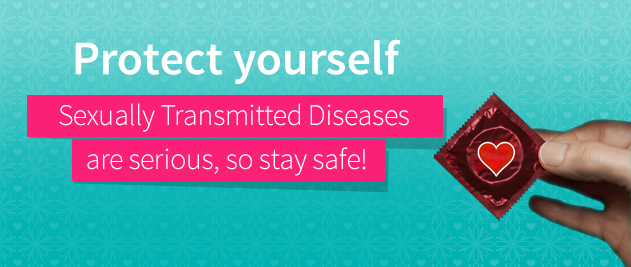
STDs
Sexually Transmitted Infections cause Sexually Transmitted Diseases – many of them for life.
They’re called ‘sexually transmitted’ because they’re spread from person to person during any sexual activity. The mother can even pass these on to her baby during pregnancy and birth.
So be smart, girls! The BEST way to protect yourself from an STD is not to have sex until you are in a committed relationship, but if you must have sex, INSIST on using a new, quality condom every single time you have sex. No condom = no sex! Even oral sex (from the genitals to the mouth and from the mouth to the genitals) can spread these types of infections. If you’ve had unprotected sex and have some of the symptoms of a STD, it’s very important to go to your doctor or clinic ASAP.
Sexually Transmitted Diseases are serious! Many today can’t be cured. Every STD is an opportunity for HIV to be transmitted. While some have symptoms, others (like chlamydia) don’t. While some (like Gonorrhoea and syphilis) can be cured, others (like herpes) will be with you for life! Some infections may leave no scars, but others can damage the reproductive system so that a woman can’t have a baby. The most severe, HIV, is life-threatening. Others can cause abnormalities in unborn babies.
JUMP TO THE SECTION YOU’RE INTERESTED IN BELOW:
- HIV & AIDS
- GONORRHOEA
- GENITAL WARTS
- SYPHILIS
- HERPES
- HUMAN PAPILLOMA VIRUS (HPV)
- CHLAMYDIA
- TRICHOMONIASIS
- HEPATITIS B
- PUBIC LICE
SYMPTOMS OF SEXUALLY TRANSMITTED DISEASES
- Flu-like symptoms when first infected
- A discharge – either from the vagina or the penis (called the ‘drop’)
- Ulcers anywhere on the genitals
- Warts on the genitals
- Painful sores or pimples on the genitals
- Swollen glands in the groin
- Itchiness in the genital area
- Some STD’s don’t even have symptoms!
TREATMENT FOR AN STD
- Blood tests or a swab of the discharge will identify the type of infection so that the right type of treatment can be prescribed.
- Bacteria can be treated with antibiotic injections. The full course must be taken. Unfortunately syphilis and gonorrhoea have become immune to many antibiotics, which means that they’re becoming more difficult to treat. All sexual partners must also be treated.
- NB: Viruses cannot be treated. Herpes and HPV warts can be burned off but they will come back – especially when the person is sick with another infection.
- Fungi can be treated with anti-fungal creams.
- Pubic lice (‘crabs’) can be treated by shaving and using a special soap.
- Couples should not have sex when one party has an active infection.
- Pregnant women are tested for STD’s at their first ante-natal appointment.
- Some virus infections like HPV (human papillomavirus) can be vaccinated against but there is no guarantee of full protection because only 4 types of the virus can be prevented this way – and there are over 100 different types of this virus!
- Condoms are not 100% protective because they only cover the penis and many infections on the skin of genitals are passed on skin-to-skin (even without an open sore) during sex.
Having a Sexually Transmitted Disease is no joke and many people with it are ashamed to go for treatment. Unfortunately, this only makes matters worse! It is also very important for people to go for treatment as a couple – otherwise they keep re-infecting one another or worse … spread the infection if they have sex with somebody else!
Women who do not go for treatment when there were symptoms of an infection can become infertile and this may only be evident when she is older and wants to have a baby. This can cause a lot of unhappiness and heartache in a marriage. Young people should be told the truth about Sexually Transmitted Infections and the life-long diseases that they cause.
HIV & AIDS
WHAT IS HIV?
Human Immunodeficiency Virus (HIV) is a virus that attacks and kills the body’s white blood cells, which are the body’s immune system. When this happens, infections that are normally destroyed by the body’s immune system can take control. Without treatment, a person can become very ill and even die.
WHAT IS AIDS?
AIDS stands for Acquired Immunodeficiency Syndrome which is a collection of conditions that damages or weakens the immune system. Some conditions that cause AIDS are:
- HIV
- Starvation (this can be from poverty, anorexia or prolonged illness)
- Chronic illness and chronic medications
- Some types of cancer (e.g. leukaemia) and cancer treatment
- Auto-Immune Diseases
HOW YOU GET HIV?
HIV is categorised as a sexually transmitted disease that’s mostly passed from person-to-person during sex where there’s an exchange of sexual fluids (semen and vaginal mucous). The virus can also be spread when there is fresh blood and an open wound. It can also be passed on to the baby during the birth or if there is bleeding during the pregnancy. If a breastfeeding woman is not taking ARV’s (anti-retroviral drugs) she can pass the virus on to her baby through her breast milk.
The only way to avoid contracting HIV is not to have sex until you are in a committed relationship AND you and your partner have been tested for HIV. Condoms MUST be used if one of the couple is HIV positive. Even when the couple is married! Condoms must also be used if both parties have HIV because every sexual act will INCREASE the viral load if condoms are not used.
WHO IS MORE AT RIST FOR GETTING HIV
- Women who use contraceptives are at an increased risk for getting HIV because contraceptives change the cells of her cervix (mouth of the womb) making them easier for the HIVirus to attack.
- Women younger than 25 also have an increased risk of getting HIV because their cervix is young and not fully developed.
- During the fertile days of a woman’s menstrual cycle, she is at a greater risk for getting HIV because her cervix is OPEN during this time.
- Uncircumcised men have an increased risk of being infected after sex because the foreskin can trap the virus, increasing the risk of transmission after sex.
THE SYMPTOMS
A person may have flu-like symptoms for a few days immediately after getting the virus. After that there are no symptoms for many years until the person keeps getting sick or a woman gets pregnant. Then blood tests will be done – including a test for HIV – and this is when the diagnosis is made.
Some of the symptoms that a person would go to the doctor for are:
- Fever (feeling hot and cold all the time)
- Headaches
- Sore muscles
- Diarrhoea
- Swollen lymph glands
- Skin rashes
THE TREATMENT
There is no cure for HIV. ARV’s or anti-virals are prescribed when a person’s immune system (CD4 count) is very low (less than 350) and the number of viruses in the blood (viral load) is very high. ARV’s don’t cure HIV – they only help to keep the virus under control. These must be taken consistently and at the same time every day for life – even when the person is feeling well again.
People can improve their health even though they are HIV positive by:
- Eating a healthy diet of fresh fruit and vegetables, protein and fat-free carbohydrates every day
- Taking vitamin and mineral supplements
- Keeping active by playing sport, walking, swimming, dancing or yoga
- Having a goal at work and at home
- Taking up a hobby or learning a new skill
- Taking advice from their doctor (e.g. to stop smoking), having regular blood tests and check-ups and taking the medications every day the way they are prescribed
- Respecting their sexual partner and taking precautions not to spread the virus
- Setting an example to the community by living positively and helping others to do the same.
HIV in South Africa and around the world is no longer a death sentence. It can be a fresh commitment to a new way of life. HIV positive people should not be shunned or judged – they should be helped and motivated to manage their disease. Unfortunately HIV is also very expensive to manage and treat, but it can be prevented. Prevention is the cure for HIV.
GONORRHOEA
WHAT IS GONORRHOEA?
Gonorrhoea is the most common STD affecting the urethra in men and the vagina in women – but it can also spread to other parts of the body and cause Pelvic Inflammatory Disease (PID) and infertility in women. It can also increase the risk for septic arthritis. It causes a contagious discharge that can infect the throat (oral sex) and rectum (rectal sex), and the eyes of a baby during birth.
HOW DO YOU GET GONORRHOEA?
Gonorrhoea is found in the discharge and is spread by all kinds of sex, including oral sex. It can also be passed onto the baby during pregnancy and the birth.
THE SYMPTOMS
Gonorrhoea causes a smelly, pussy discharge. You will know when you have it when you see the discharge.
- Smelly vaginal discharge (called ‘the drop’ in men)
- Itchiness or swelling of the vagina
- Abdominal pain
- Pain during sex
- A burning sensation when urinating
- A sore throat
THE TREATMENT
Gonorrhoea is treated with antibiotics. It is important to have a full course of treatment, and for both (and any other) partners to be treated. Take a trip to your local doctor and get checked out if you’re experiencing some symptoms. Remember that the best and easiest preventative measure is to delay having sex until you are older and in a committed relationship – but if you must have sex, INSIST on using a condom. No condom = no sex.
SYPHILIS
WHAT IS SYPHILIS?
Syphilis is a sexually transmitted infection caused by bacteria. People infected get painless ulcers on sex organs. Because they're painless, they may not be noticed or just get ignored. When this happens, the ulcers may seem to have gone away, but the syphilis has become stronger in the body, and the syphilis reappears as a rash - especially on the palms of the hands and the soles of the feet. If still not treated, syphilis can go to the brain and cause severe damage.
So, if it’s left untreated, things could get very serious.
HOW DO YOU GET SYPHILIS?
Syphilis is very contagious in the early stage, which means you can get it by having sex with someone who is infected. Condoms are not 100% safe because they only cover the penis and the sores can be anywhere on the groin. The infection is spread skin-to-skin. People with visible sores or who are being treated for syphilis should take the responsibility of abstaining from having sex until the doctor or clinic has given them the all-clear that the infection has been cured.
THE SYMPTOMS
There are no other symptoms besides the painless ulcers – and this is why syphilis goes undetected and untreated and people continue having sex and spreading the infection!
Blood tests can determine whether a person is infected with syphilis or not.
THE TREATMENT
Antibiotics can help to clear the infection – but in recent years, the bacteria have become resistant to antibiotics. This means that stronger types of antibiotics need to be used with more serious side-effects.
Prevention is better than cure!
GENITAL WARTS
WHAT ARE GENITAL WARTS?
Genital warts are not the same as skin warts. Genital warts are caused by a virus spread by having sex – mainly HPV or Human Papillomavirus. These warts may be painless and can spread into the vagina and even into the rectum.
These warts can be removed by burning them off – but they will always come back! They are infectious for life – even when there don't seem to be any warts, the infected person is always infectious.
HPV that spreads to the cervix is one of the leading causes of cervical cancer in women.
HOW DO YOU GET THEM?
Genital warts spread simply by touching! They spread from person-to-person during sex when skin touches skin. A condom only covers the penis – which means that it is not 100% protective. Remember, an infected person does not have warts all the time – but even if there are no visible warts, the infection is there and can spread. If you get the infection, you may not have any visible warts for a while – and these too will come and go. Once you have HPV you have it for life. Anybody that you have sex with risks getting the infection.
One of the biggest risks of repeated HPV infections is that it can become cancerous – especially of the cervix (mouth of the womb). Teenage girls have an immature cervix which means that they have a much bigger risk of getting cervical cancer than older women do.
THE SYMPTOMS
Similar to other STDs, there are often no symptoms. Sometimes the warts will even appear inside the vagina, so they’ll be pretty tricky to see. They can also appear as skin coloured growths on the outside of the genitals and could very well hurt, itch or bleed after having sex (even with a condom)
THE TREATMENT
These warts may come and go – but when they grow back, they can become more extensive. HPV that has spread to the cervix can be detected by having a Pap test.
All STD’s need to be treated ASAP.
HERPES
WHAT IS HERPES?
Herpes is one of the most common STI’s in teenagers! This is a scary one. Herpes is a virus and like all viruses, it remains in your body once you’ve contracted it. There are two types of herpes that cause small, painful blisters:
- Herpes Simplex Virus (HSV) Type I that usually causes cold sores around the mouth (this is NOT a STI)
- HSV Type II that causes very painful genital ulcers/blisters/warts.
HOW DO YOU GET HERPES?
Herpes is highly infectious!
- HSV Type I is usually passed on through kissing
- HSV Type II is passed on through any sexual contact
Just because you can’t see sores on yourself or your sexual partner, it doesn’t mean the virus is not active.
Condoms can help prevent it, but they are not always effective because the virus can be spread by the skin not covered by condoms. The best idea is to wait until you are an adult before making the decision to become sexually active. Then, if the partner you have chosen for life has also waited to have sex, there is no risk of either partner having any sexually transmitted infection or any of their complications.
THE SYMPTOMS
- General symptoms of feeling unwell with a fever and headaches and swollen glands
- Painful ulcers anywhere on the genitals
- May be painful to pee
THE TREATMENT
There is actually no cure for the Herpes, only the symptoms can be treated:
- Pain killers for the ulcers
- Ulcers can be cleaned and helped to dry with corn starch
- Loose underwear should be worn
- Medication Zovirax is prescribed (it is very expensive). It helps to control the infection, but cannot cure it.
Herpes is diagnosed by identifying the blisters. It is important to go for treatment. Sores are difficult to diagnose once they dry up, so if you experience any symptoms, you should go to your doctor ASAP.
HUMAN PAPILLOMA VIRUS
– also described under genital warts
WHAT IS HPV?
HPV is a family of 100 variants of this virus - some of which cause genital warts. Repeated infections are one of the leading causes of cervical cancer in women. It can also cause mouth and throat cancer if it is spread through oral sex.
HOW DO YOU GET HPV?
Having sex (including thigh, finger, reverse-gear, oral and rectal sex) increases your chances of getting various types of the virus.
THE SYMPTOMS
Genital warts are one way that this sexually transmitted disease presents itself. The other ‘high risk’ versions of the virus usually do not produce any symptoms.
THE TREATMENT
The body’s immune system will fight off certain ‘high risk’ types of HPV, but if the virus sticks around in the system, it may start to cause changes in the cells of the cervix. This can lead to cervical cancer.
Speak to your doctor about HPV immunisation.
CHLAMYDIA
WHAT IS CHLAMYDIA?
Chlamydia is a symptomless STD caused by bacteria, which can lead to Pelvic Inflammatory Disease (PID) if left untreated. PID affects the pelvic region and can lead to infertility in men and women by blocking the tubes/urethra or vas in men. Pregnant women can give it to their baby during the birth causing conjunctivitis (an eye infection) and/or pneumonia.
HOW DO YOU GET CHLAMYDIA?
Chlamydia is transmitted through unprotected sex (both vaginal and oral) with someone who is infected. They might not realise that they have it, so it’s vital that you use a condom at all times.
THE SYMPTOMS
Most people don’t show any symptoms at all, but be on the lookout for:
- Unusual vaginal discharge and/or bleeding – especially after having sex
- Flu-like symptoms
- Pain in your lower abdomen
- Painful urination with the feeling of needing to pee all the time
The best way to tell if you have Chlamydia is to get tested – it’s as simple as a urine test or a cervix swab at your doctor.
THE TREATMENT
Chlamydia can be treated with antibiotics. It is very important that both parties be tested and treated. Prevention is better than cure. Wait until you are older before you have sex.
TRICHOMONIASIS
WHAT IS TRICHOMONIASIS?
Trichomoniasis is an infection that affects the vagina, cervix, urethra and bladder in the form of an infection. Many people are not familiar with Trichomoniasis, but you should be. Keep reading and guard yourself against this STD.
HOW DO YOU GET TRICHOMONIASIS?
Trichomoniasis is easily spread during unprotected sex with an infected person. Again, your best bet against infection is to wait before you become sexually active, but if you are already having sex, make sure that you use condoms EVERY TIME.
Remember not to let anyone try and convince you that it’s alright to have unprotected sex, because it’s not!
THE SYMPTOMS
Greenish-yellow discharge that may also be frothy and smelly
- Itchiness
- A burning sensation when urinating
THE TREATMENT
Trichomoniasis is treated with antibiotics. Your doctor will conduct a pelvic exam and take a sample of your vaginal discharge to test if you have been infected. It is important that both partners be tested and treated.
HEPATITIS B
WHAT IS HEPATITIS B?
Hepatitis B is a very serious and incurable virus that causes inflammation of the liver and is particularly high amongst gay men. When the liver is malfunctioning, you can become extremely ill for a long time.
HOW DO YOU GET HEPATITIS B?
Hepatitis B spreads through body fluids, such as:
- Semen
- Vaginal fluids
- Saliva
- Urine
- Breast milk
- Blood
- Contaminated needles (drug users)
- Unsterilised tattoo needles
- Dirty razor blades used to shave heads
Like most other STDs, it is passed on through unprotected sex. It can also be passed on to an unborn baby during pregnancy and birth.
THE SYMPTOMS
There are often no symptoms at all, so most people are not aware that they have the infection. You should visit your doctor and get a blood test if you are experiencing:
- Fatigue
- Pain in the abdomen
- Dark urine
THE TREATMENT
There is no known cure, but Hepatitis B can be prevented with a safe and effective vaccine. Sometimes your body fights the virus and keeps the infection under control – but it will never be completely cured.
All babies are vaccinated free of charge. Sexually active teenagers can also be vaccinated.
PUBIC LICE
WHAT ARE PUBIC LICE?
Pubic lice are small insects that live in pubic hair. You might have heard them being referred to as crabs. Pubic lice are different from hair lice and body lice. They’re unsuspecting unwelcome little guests that can spread simply by sleeping in the person’s bed who has them! Be smart girls – prevention is better than getting them!
HOW DO YOU GET PUBIC LICE?
Pubic lice are spread through close body contact, and can even be spread through bedding, towels or other items that have been used by an infected person.
Unfortunately, wearing a condom during sex will not protect you from pubic lice, but this is NOT an excuse to not use one!
THE SYMPTOMS
You’ll probably need a microscope to see them, but you can usually feel them.
Body lice are found on coarse body hair such as leg hair and armpit hair. Pubic lice are found in pubic hair. The insects draw blood from the skin and lay their eggs in the hair. When the eggs hatch, these lice continue the life-cycle of the insect. Sores can develop where they suck the blood and it causes an itch.
You will feel very itchy all around your pubic area because of the allergic reaction to the lice bites. Be careful! Scratching there can transfer the lice to other parts of the body.
THE TREATMENT
Your doctor will be able to tell if you have them, and what you need to do. Usually, shaving and using a prescribed lotion (shampoo) will kill them.


 Kenya
Kenya Nigeria
Nigeria 



